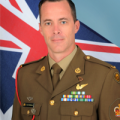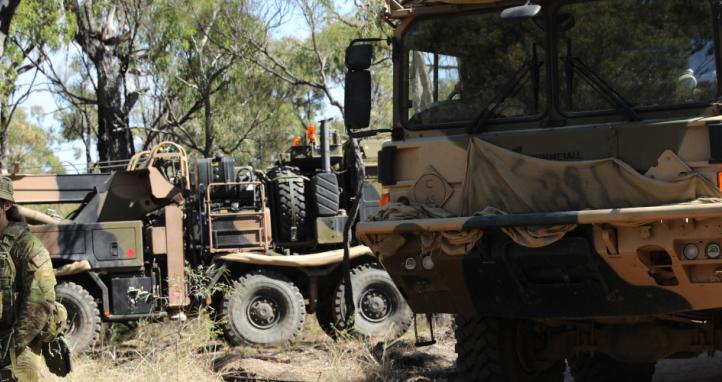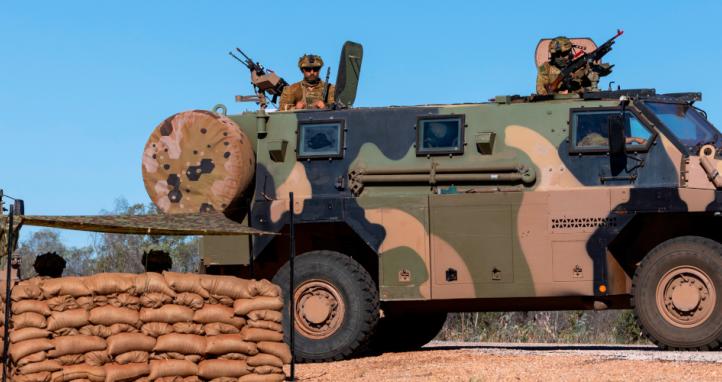'The most important thing I learned is that soldiers watch what their leaders do. You can give them classes and lecture them forever, but it is your personal example they will follow.'
– Colin Powell
Australian Army doctrine does not explicitly outline the role of the Regimental Sergeant Major (RSM). Defining the role is often left to experience, mentoring and learned knowledge. From the time a soldier has their first interaction with an RSM until they are a SNCO/WO, they are exposed to the roles, leadership attributes and responsibilities of the RSM. Eventually, that soldier may be selected to attend the RSM course where the intricacies of performing RSM duties are refined, and senior RSMs facilitate mentoring. What then, is the role of the RSM? This article will outline the varying roles required to be filled by an RSM by highlighting key areas of importance. This article is not intended to provide a finite definition of an RSMs role; moreover, it is written to stimulate discussion from across all ranks on what we think the RSM role is today, and more importantly, in future warfare.
Be a Translator
The RSM is expected to translate information from senior officers, by analysing the information and passing it on to soldiers. Information and critical messages such as Army in Motion, Accelerated Warfare and Good Soldiering are often not read by junior soldiers, or not understood well. The RSM’s role is to ensure all ranks receive the key information released by the Army’s senior leadership, and that they understand it – in soldier speak. What does it mean to the soldier? What does it mean to the unit? What do the changes to the FORGEN or OPGEN cycle mean to future operations and training? The RSM needs to be fully conversant with all this information, and more, to ensure soldiers receive and understand what is being asked of them, their unit and the Army. An RSMs use of the CSMs to translate this information up and down the chain is paramount. 'Soldiers who understand why and how their efforts fit into the big picture, perform better. Informed Soldiers are effective Soldiers.'[1]
The corollary of translating senior officer information to the soldier is taking what the soldiers are saying back up the chain of command. Communication works in both directions, and it is up to the RSM to echo the soldiers’ voice to the higher headquarters. Whether the concerns raised by soldiers are to do with resources, training, food, accommodation or morale, this information must be passed on to the commander. Furthermore, the RSM needs to filter this information to not sound like a complaint, but a genuine concern – without losing the message. Additionally, the commander also wants/needs to know what is working well in the unit. This knowledge will help shape future guidance released from the commander and help shape the unit’s direction.
Be a Thermometer
The tempo and morale of a unit ebbs and flows with the Army's tides. The RSM should be ahead of identifying when the unit has reached capacity – they should identify the warning signs and indicators to ensure the unit does not get to the culmination point. The RSM needs to be out in the unit, speaking to soldiers and officers to gauge morale and tempo (among other factors) and report back to the Commanding Officer (CO) on how the unit is holding together. The CO must rely heavily on the RSM as the senior and most experienced soldier of the unit.
Honest and unfiltered feedback is often required between the RSM and the CO. However, undesirable or delicate feedback needs to be balanced and usually communicated in private. The adage of ‘praise in public but criticise in private’ is apt when leadership discusses members of the unit or unfolded events. The RSM will quickly learn how and when the CO wants to hear different types of information from the RSM and mould their communication style to best work with the CO as a leadership team.
Senior Enlisted Advisor
When soldiers or officers are asked what the RSM's role is, the most common response is 'the RSM is the senior enlisted advisor to the commander' – but what does that mean?
The RSM is the senior soldier of a unit and generally the most experienced person (soldier or officer) in the unit; therefore, their advice to the CO on all matters including training, operations, tactics, morale, welfare, discipline and ceremonial (to name a few) is crucial. More importantly, the RSM must strive to get it right; although this will not always happen – we are all human after all. Furthermore, if we have a zero-tolerance for failure, we restrict the means for innovation and creativity.
It is important to remember that the RSM does not hold the command authority or responsibility of the CO. The RSM manages specific responsibilities such as unit discipline and personnel; however, he/she does this on behalf of the CO, who maintains overall authority and responsibility for everything in the unit. For this reason, the RSM must provide accurate advice to the CO and perform their delegated responsibilities within the CO's intent.
Mentor
One of the RSM's key roles is to mentor the Senior Non-Commissioned Officers (SNCOs) and Warrant Officers (WOs) in their unit. Mentoring comes in all different formats – through PME, individual counselling, leading by example, education, or any other medium that helps develop those around you. If the RSM gets the mentoring of the SNCO/WOs right, it should cascade down to the unit's JNCOs and soldiers.
To facilitate the mentoring of the SNCO/WOs, the RSM needs to establish a strong relationship with their supervisors (Platoon/Company Commanders, Operations Officer et. al.). Because the SNCO/WOs do not work directly for the RSM, but for their commander, the RSM must ensure that commanders are kept informed of what tasks/duties the RSM is sending to the SNCO/WOs to avoid dual tasking the CSMs (when the CO has tasked the OCs). The RSM is not in the chain of command but vital to it because of their experience and role in the support chain. Furthermore, the RSM's voice carries significant weight with the soldiers of the unit.
The RSM must work to earn the officer's trust to become a confidant, mentor and advisor. Additionally, the RSM should be heavily involved in guiding the junior officers in the unit. Again, a good relationship between the Adjutant and the RSM is vital to ensuring success.
Developer
RSMs are often too busy to develop themselves due to the unit’s tempo and the job’s vast requirements. Nevertheless, if the RSM does not put time aside to improve themselves, they do not set the standard for those below them to self-develop. We all need to continue to learn and progress – what got us to our current job/position/rank will not get us to the next level without further development. Developing yourself and those around you helps to build the foundations for a healthy and productive unit. Development can come in many formats – formal education, reading, attending professional development courses (inside and outside the military), attending unit run PME, or merely watching a TED talk. When emphasising the need to read as a form of self-development, former Secretary of Defense and United States Marine and General Jim Mattis wrote: 'If you haven’t read hundreds of books, you are functionally illiterate, and you will be incompetent because your personal experiences alone aren’t broad enough to sustain you.'[2] There is no specific way to develop yourself or others, and everyone has their own way to learn. The bottom line is that we need to remember two points: not everyone learns the same way, and we need to be continually improving ourselves and others.
Be a Leader
As defined by the Australian Army, one of the core principles of leadership is to 'lead by example'.[3] The RSM must be capable of, and willing to, lead any formation they stand in front of by setting a high standard for others to emulate. The RSM's personal examples of physical fitness, communication, fieldcraft, job knowledge/skills, and dress and bearing will help set the unit’s standard. The RSM must be willing to admit fault when warranted, better themselves through the experience and help others to learn from those mistakes. In his article 'More leaders need to get punched in the face,' Command Sergeant Major Michael S. Burke (United States Army) provides an insight into the moral and physical courage required to be a leader in the Army. Burke writes: 'As leaders, we cannot be afraid of failure...fear of defeat or failure cannot dissuade leaders from setting the example, it should inspire them to be better!'.[4] Everyone is a leader to someone, regardless of rank – some stand in front of more people. The RSM is a leader to the entire organisation and should strive to set and maintain the Army’s standards through personal example, mentorship, and humility. At all times, the RSM must demonstrate the 'capability; fitness, endurance, character and resilience required to occupy the rear rank'.[5]
Play ‘Fullback’
The RSM's role is not only expansive, it is crucial to a successful unit. Whilst simultaneously performing a varying array of tasks, the RSM must, at all times, ensure the CO is shielded. The RSM needs to ensure the CO's orders are carried out per their direction and intent – and they are moral, ethical and legal. As one of the CO's key advisors, the RSM must advise the CO if any direction within the unit is in breach of Army directives or legal orders by being the last line of defence – play fullback. The RSM must also keep a close watch over the CO and their workload. Together with senior officers in the unit, the RSM needs to guard the CO against their most significant threat – themselves!
This article aims to provide the reader with a better understanding of the varying roles an RSM is required to fill within a unit. While most Officers and WO/SNCOs can explain the RSM's tasks in the field with the Battlefield Clearance Team, the Command Post and Range Safety; however, the RSM's role in a barracks environment often brings mixed interpretations and expectations. Moreover, as we progress further into the future, those roles will invariably expand even further. Future warfare’s uncertainty could see a greater involvement for the RSM at the tactical level, requiring a deeper understanding of emerging technologies and an understanding/education at the operational level. However, one thing will always remain certain – the role of the RSM in a unit is critical to its success or failure. The RSM will remain a key position in any organisation, and it is up to all levels of command to ensure the RSM is employed to his/her full capability.










Grant Lawson( known as Sergeant Major and other things since 2004)